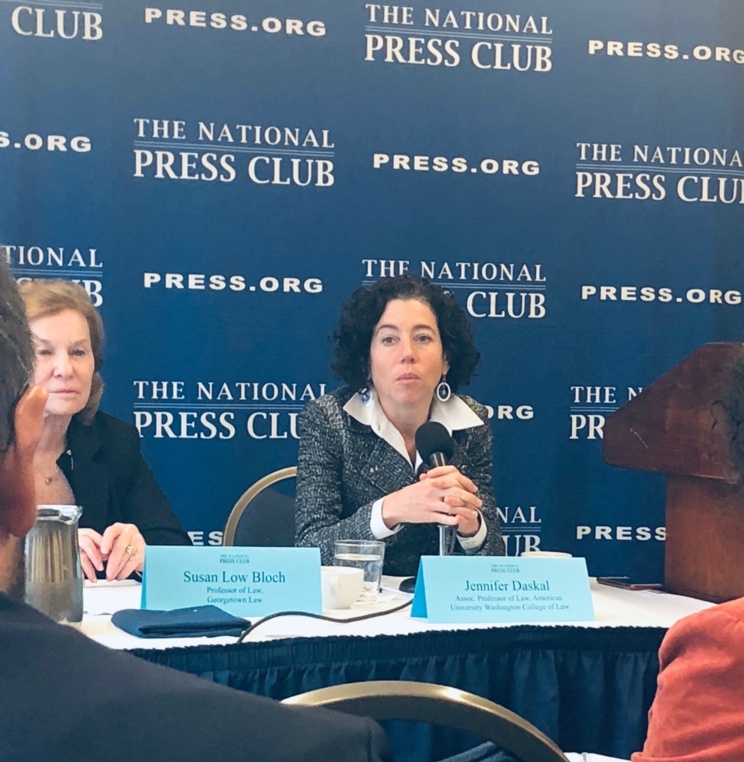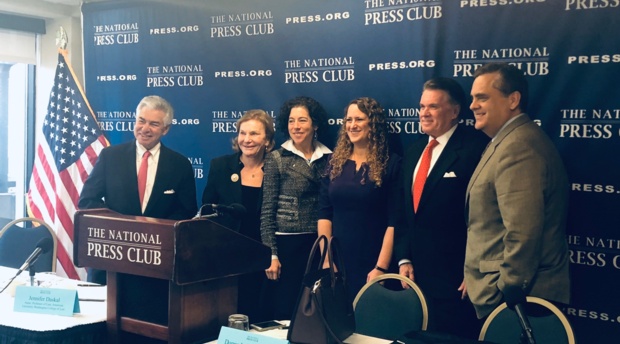Professor Jennifer Daskal Discusses Mueller Investigation, Impeachment at National Press Club Panel
November 16, 2018

On Thursday, Nov. 15 American University Washington College of Law Professor Jennifer Daskal participated in a Headliners Newsmaker panel discussion at the National Press Club in Washington, D.C., entitled “Presidential Jeopardy: Impeachment, Indictment and the 25th Amendment.”
Daskal, a faculty expert who specializes in criminal law, national security, and constitutional law, worked as counsel to the Assistant Attorney General for National Security at the Department of Justice prior to joining AUWCL. The panel also featured Richard Ben-Veniste, a former prosecutor with the Watergate Special Prosecutor’s office; Jonathan Turley, professor at George Washington University Law School and lead counsel on the last impeachment trial in the Senate; Jack Quinn, former White House counsel to President Bill Clinton; and Susan Low Bloch, professor at Georgetown University Law Center.
The panel was moderated by Donna Leinwand Leger, former National Press Club president. With Democrats now controlling the House of Representatives, and House members able to exercise investigative powers they did not formerly have in the first two years of the Trump administration, Leger asked if this heightened oversight will likely to lead to an impeachment.
“There’s questions about what will happen with the Mueller investigation, whether Congress does anything to protect Mueller,” Daskal said. “One of the questions is the degree to which Mr. Whitaker can, and will, place controls on the Mueller investigation. The most dramatic thing he could do would be to just end it – but that seems a bit of a political suicide on the part of the executive branch, and hopefully not something that is going to happen.”

But, Daskal said, there are “behind the scenes” actions that could be taken, including demanding ongoing reports and taking steps to preclude actions. Last week’s argument at the U.S. Court of Appeals for the District of Columbia Circuit as to the constitutionality of Mueller’s appointment highlighted this risk, Daskal said. In that case, the Department of Justice was defending the appointment on the grounds Mueller is an inferior officer and does not have to be approved with the advice and consent of the Senate, she said. In support of the conclusion that Mueller is an inferior officer, Deputy Solicitor General Michael Dreeben emphasized the degree to which he was subject to Department of Justice oversight. The person (now Whitaker) who oversees Mueller can both demand reporting and prevent Mueller from taking specific actions.
Throughout the discussion, many of the panelists drew comparisons between a potential impeachment of President Trump and the impeachment of former President Clinton in 1998. Daskal was wary of such analogies and cautioned against the “idea that there is an equivalency.”
“I’m not advocating for impeachment. But, depending on the result of the Mueller report – if in fact there is evidence of obstruction of justice and aiding and abetting or conspiring to influence the election in support of foreign campaigns – that to me should be taken very seriously and does rise to the kinds of things where impeachment might be an appropriate remedy,” Daskal said.
Daskal discussed the Whitaker appointment and various other topics Wednesday, Nov. 16 on the 100th episode of the National Security Law Podcast, which was live-recorded on the AUWCL campus. Listen to the podcast here.